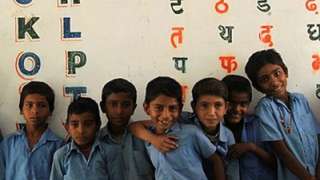MEDIA
From ‘unrealistic’ to ‘ground-breaking’, reactions to National Education Policy vary
www.indianexpress.com | July 31, 2020
The new National Education Policy (NEP), which was unveiled on Wednesday, has met with mixed responses from academicians and education experts.
From being hailed as being ground-breaking and long overdue reforms in the education sector to criticism for being “unrealistic, impractical and unspecific”, the new National Education Policy (NEP), which was unveiled on Wednesday, has met with mixed responses from academicians and education experts.
As far as the school education sector goes, one of the biggest changes is bringing pre-school education under the NEP’s ambit.
Nandkumar Kakirde, secretary of Bhartiya Vidya Bhavan, said that for the first time, “pre-primary education has been brought under NEP. Over the last few years, there has been mushrooming of pre-schools across the country with no control on curricula, pedagogy and standards. They make a lot of money with little control. Also, this emphasis on teaching in the mother tongue, I feel, is good for those admissions taking place under RTE Act which so far are done in English schools only. I believe comprehension in your own language is easier, especially at an young age, and now parents can choose the medium of instruction.”
Rustom Kerawala, chairperson of the Ampersand Group, which runs Vibgyor School, also appreciated the new NEP for the special emphasis on Early Child Care Education (ECCE).
“The universalisation of ECCE will lay the foundation for the development of every child, honouring their unique skill-sets at an early age. The integration of co-curricular subjects at par will help students honour their hobbies and skills and make value addition in the areas of preference,” he said.
However, not all were as optimistic. Markus Deshmukh, a minority schools consultant and spokesperson for Bishops School, said, “The initiative of promoting education in the mother tongue/regional language till Grade 5 will hamper the quality of education, especially for those children whose parents’ are in defence services or who have a transferable job on the national level. Therefore, a three-language formula should be adopted. Also, the 10+2 structure of school curricula is to be replaced by a 5+3+3+4 curricular structure corresponding to age 3-8, 8-11, 11-14, and 14 to 18 years. There is no mention in the policy that from when it is to be implemented. There is a huge task of preparing syllabus and content of curriculum since India has several boards, right from state boards to CBSE, ICSE, NIOS, IB, and IGCSE, which frame their own syllabus. There is no clarification in NEP on how the national policy curriculum set by NCERT is going to help these boards.”
Meanwhile, as far as higher education goes, multi-disciplinary learning approach, creation of exit points, a four-year undergraduate programme, among other steps, have been welcomed.
Principal Director of Symbiosis, Vidya Yeravdekar, said that a new NEP was long due since the last one was passed in 1986. “The world has changed since then… India has seen liberalisation, globalisation and economic change. At least private universities could update and change curriculum but public universities remained largely stagnant. The new NEP is very forward and student-centric. Like the Academic credit bank, which allows students to pick and choose what they want to study. It will lead to two things — mobility of students across faculties and universities will increase… However, what is critical now is training teachers and changing their mindset to adapt to the new challenges”.
Chetan Wakalkar, managing trustee and group director, Indira Group of Institutes, said that a completely revamped school education system with greater focus on the multi-dimensional development of the child augurs well for future generations. “Whether it means an amalgamation of all existing school boards into a single national board remains to be seen , as that would require a relearning exercise of unprecedented magnitude in the history of a nation of our size. On the higher education front, the emphasis on autonomous structure of institutes as the way forward would surely enhance the quality. Additionally, the liberal approach to selection of courses would brings the much-needed global format to Indian higher education,” he said.
Dr Dishan Kamdar, vice-chancellor of FLAME University, termed the NEP as progressive and a gamechanger. “Multidisciplinary colleges in every district by 2030 will encourage liberal arts education. The renewed focus on arts, humanities, importance of research, mandating all institutions to offer a multi-disciplinary form of education will ensure that we will skill our young people for life and prepare them for diverse careers in the future. NETF will be a milestone in the digital learning agenda, especially creating an outreach in the remotest areas so that the NEP’s aim to achieve the Right to Education for all children in the age group of 3-18 years by 2030 will now be a possibility,” he said.
*Views expressed are personal.

